How Much Does Van Life Cost? A Breakdown of Common Expenses
Curious about what it costs to live in a van? Learn the most common expenses and how much to budget.
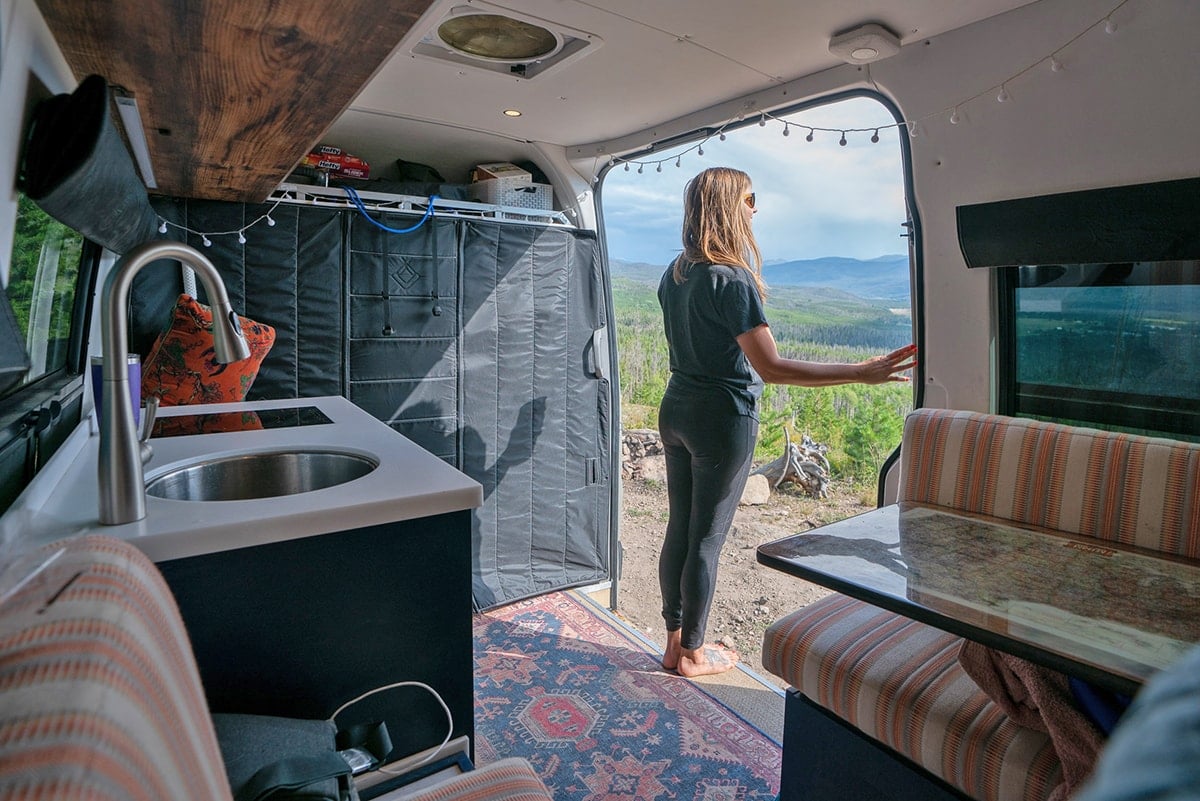
How much does van life cost? This is one of the most common questions we get about van life, and as you can likely guess, the answer is it depends. Van life costs can vary from person to person depending on how much you drive, how much you free camp, how often you cook vs eat out, and a variety of other factors which we’ll cover in this blog post.
What your total van life expenses really come down to is whether you treat van life like a vacation or you stick to a similar budget as if it were your normal life at home.
To help you prepare for a financially stable van life, I share what some of my van life costs have looked like over the last few years and what we budget for when we are traveling. I hope this helps you get a rough estimate of what expenses to expect when you live in a van.
This post may contain affiliate links.
Budgets For Van Life Vary Greatly
Let’s start with the common question, how much does van life cost? Unfortunately, there is no easy answer to this and budgets vary greatly from person to person. The good news is that with proper planning, van life can cost as much or as little as you want it to.
Van life doesn’t have to be expensive. When choosing the right van for your lifestyle, I strongly advised you to buy a van within your means and the same thing goes for living within your means once you hit the road.
You can choose to keep things simple and do van life on a budget, or you can shell out more cash for conveniences like paid campgrounds with facilities, dining out, paid tours and activities, gym memberships, and more. By cooking your own meals, staying at free dispersed sites, and embracing slow travel, you can do van life for a minimal cost.
To give you a very rough idea of monthly van life costs, some of the van lifers we know spend as little as $800/month while a good number of van lifers we know spend around $1500-$2000/month. That includes gas, van insurance, health insurance, phone bill, food, dining out, camping and recreational fees, and everything else, except for the cost of the actual van.
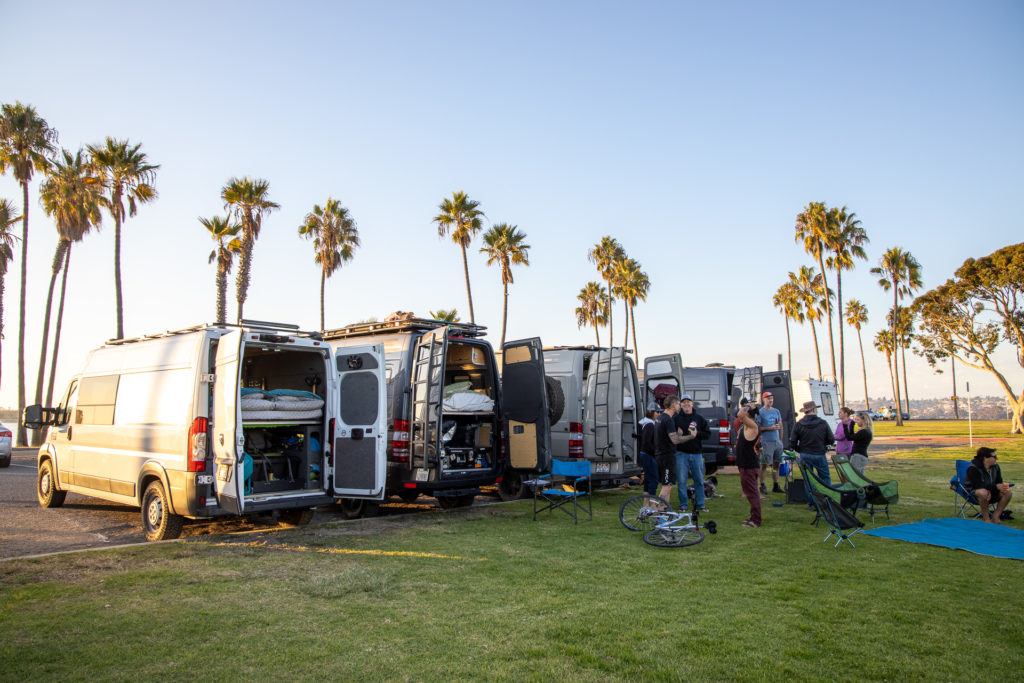
Save this post!
Enter your email & I'll send this post to your inbox! You'll also receive my weekly newsletter full of helpful advice for planning your adventures.
How Much Does It Cost To Convert A Van?
In this blog post, I’m mostly focused on daily expenses when you live in a van. However, with the upfront cost of the van being one of your biggest expenses, it would be silly to not mention it here. The main thing to remember is that you can find a van that will work for you within your budget whatever that may be.
Just like budgets vary from van lifer to van lifer, so can the cost of the van conversion. Here are some rough estimates for the new panel-style vans that are popular for conversions.
- The least expensive panel style van is the Dodge Promaster with prices starting around $41,000.
- The Ford Transit starts around $48,000
- On the more expensive end is the Mercedes Sprinter, with 4×4, prices starting around $66,000.
One expense that often gets forgotten is your taxes on your van purchase and registration. In Utah, I pay around $700 a year for registration for my Sprinter Van. I also opted for the extended warranty on my Sprinter Van which ran a few thousand dollars.
Of course, you can save money by buying a used van – either one that’s an empty slate or one that’s already been converted. I share some pros and cons to consider when buying a used van here.
Once you have the price of your empty van, then you can estimate how much your van conversion will cost. Again prices vary depending on whether you DIY or hire a conversion company. I’ve heard of people DIYing their van conversions for as low as $10,000-$20,000.
However, this requires shopping around for materials to get the best price, using second hand materials when possible, and doing everything yourself. I’d guess that for this price you are also looking at a basic build with not too many frills, especially given the rising prices of lumber.
Read next: Building on a budget? Read 5 Tips For A Budget DIY Camper Van Build.
For a higher budget, you could outsource the parts of the build you aren’t comfortable with, buy higher end components for your power system, and get a bit more detailed with your layout.
If you hire a conversion company, the price should depend on a number of factors – mainly their level of experience, the complexity of the build, and the quality of the materials and components they are installing. A newer conversion company lacking experience might charge somewhere in the $60,000-$90,000 range. If they charge more than that and don’t have at least a few vans under their belt, you want to be really sure they know what they are doing. If you go this route, make sure to check out my tips for interviewing different van conversion companies.
More experienced companies with hundreds or more vans under their belt might charge upwards of $125,000-$250,000 or more for a full conversion. While this sounds really expensive, vans in this class built by well-known companies tend to hold their value. In my experience, you also get what you pay for.
One last thing I’ll note is that there is no right or wrong way to do van life. All that matters is you do van life how you want to do it and that it doesn’t drive you into financial ruin. I know plenty of van lifers with simple vans who live on tight budgets who are much happier than those who dropped tons of money on a fully decked out van. I also know people who spent a lot of money on their vans and think it was worth every penny. So it doesn’t matter what other people think, as long as you are happy and the van was a smart choice based on your financial sitution.
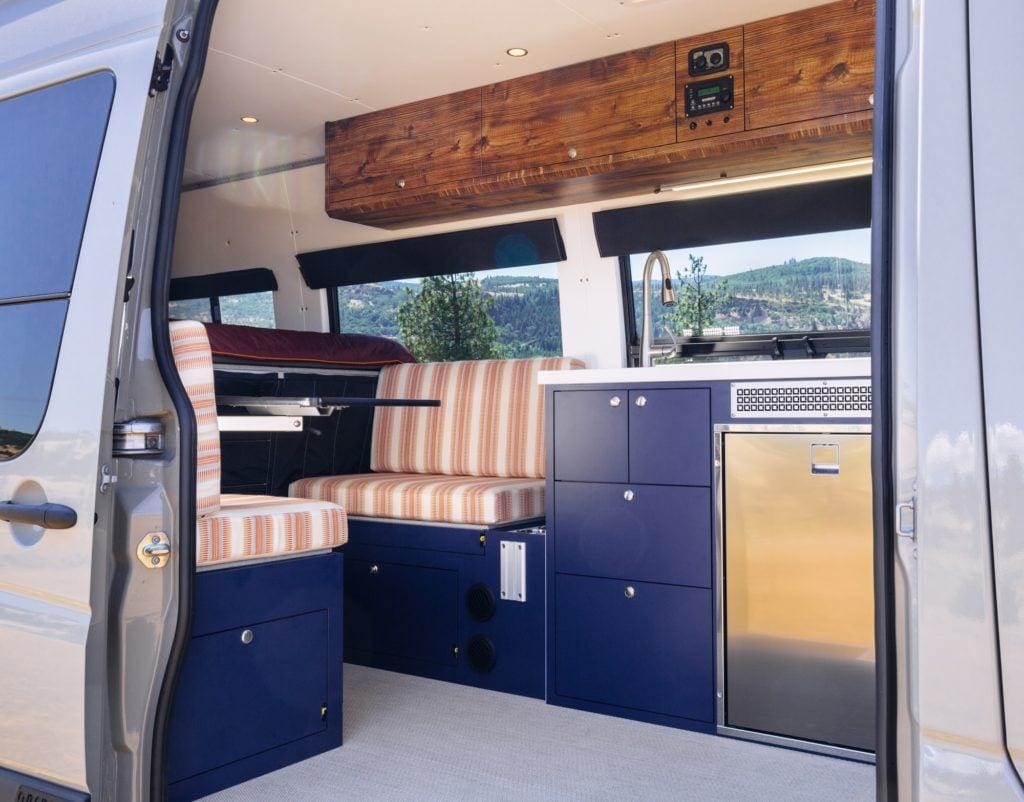
Daily Van Life Costs
Now, aside from the van itself, here are some common expenses you’ll face when living in or traveling in your van. Keep in mind that these are rough numbers provided to give you an idea of common van life costs.
Gas
Filling up your tank can cost anywhere between ~$200-600/month depending on the fuel efficiency of your van, gas prices, and how far and often you are moving. For my Sprinter, filling the entire tank costs around $90 depending on diesel prices and we’re able to go about 350 miles per tank.
Paid campsites
I’ve found that most paid campsites cost between $15-$30/night on average, so depending on how many nights you end up staying at paid campsites vs free campsites, your camping expenses can vary widely. If you stay at a paid campsite every night, it will cost between $450-900/month.
We typically choose free sites for a number of reasons. First, free campsites have fewer rules about dogs being off-leash. Second, they tend to offer more privacy. And third, it allows us to do van life cheaper!
When we choose to stay in paid campsites, it’s because there aren’t a lot of free options or we need a shower. We’ll also stay in paid campsites if we are recreating in a state or national park, and the paid campsite offers a much more convenient location to the trails we want to explore. Typically when we are traveling out west, we spend less than $100 a month on paid campsites. In our experience, however, finding free (attractive) campsites is much easier out West than along the East coast. Check out our guide to finding free campsites for tips.
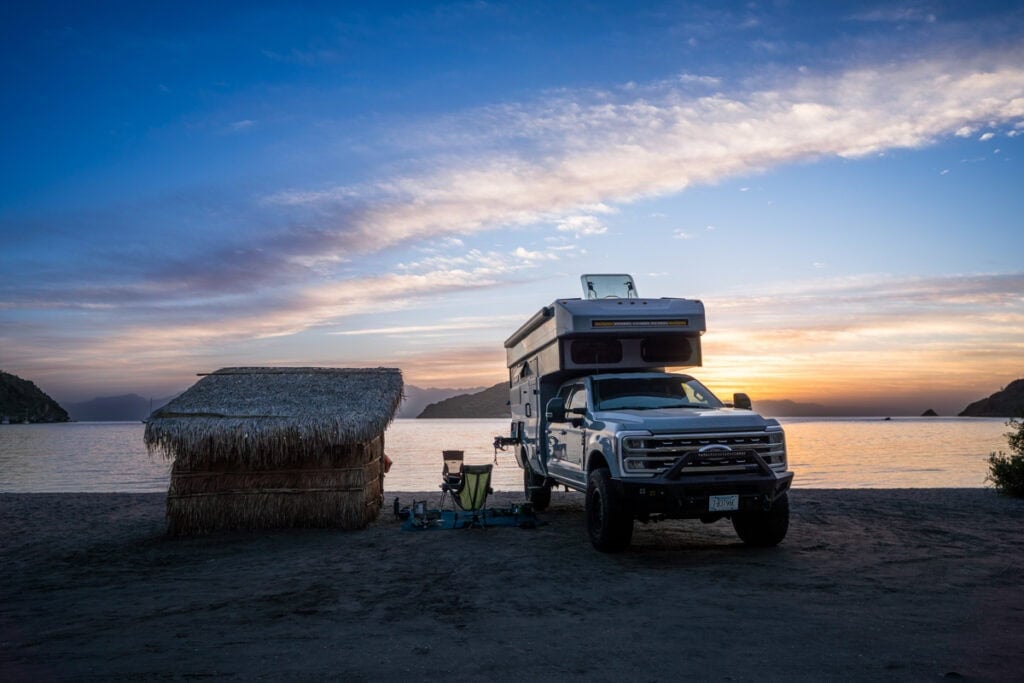
RV Insurance
We’ve seen RV insurance for converted Sprinter Vans running about $1500 per year. However, this depends on your policy, the value of your van, and the value of the stuff you have inside. My RV Insurance policy is with Progressive and currently runs around $2,000 a year. It includes collision and comprehensive coverage with a $250 deductible and covers the full replacement value for the entire conversion and the stuff inside in case the van is totaled. Be sure to read our blog post on how to choose the best RV insurance policy for your van life.
Health insurance
For someone healthy with low healthcare needs, insurance can be around $100 – $450 per month, depending on your income level and home state.
For those of you whose income is below a certain threshold, you might qualify for Medicaid or federal tax breaks, and if you’re 65 or older, be sure to take advantage of Medicare. Revisit our lesson on health insurance for van life for more on this topic.
Phone bill
Phone bills can cost anywhere from $30-100 dollars/month depending on your provider and your desired data levels.
If you want to use your phone data for the internet, you’ll probably need to budget for a more expensive plan that includes unlimited data. Check out our blog post on internet options for van lifers to see your options.
If you’re looking for an affordable single-line carrier that’s great for van lifers, check out our review of Visible Wireless.
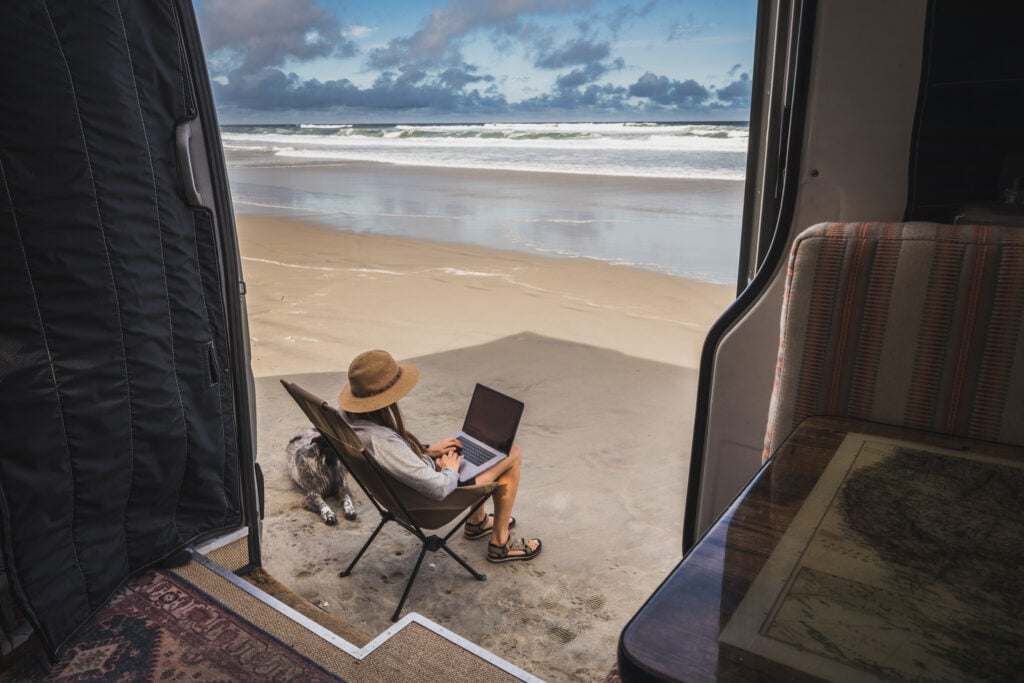
Gym membership
Many van lifers like to have a gym membership so they can shower on the road. These start at around $22 dollars/month and tend to go up from there. Planet Fitness and 24 Hour Fitness are the most popular gyms for van lifers.
We personally don’t bother with this. We get plenty of exercise outside and don’t spend enough time around cities for it to be worth it. We also opted to install a shower in our newest rig–the Rossmonster Baja Trail–which means we can shower from the comfort of our home own, even while on the road.
Groceries/Food
When it comes to food, expenses vary widely from person to person. How much you spend each month will depend on where you grocery shop, how much you cook vs eat out, and how often you purchase coffee and other drinks out.
Ryan and I buy mostly organic food and we shop at nicer groceries stores. Especially this past year, we hardly dined out at all, we make all of our own coffee, and we don’t drink any alcohol. Our food runs between $600-800 a month for the two of us.
You can certainly do it cheaper depending on your food preferences.
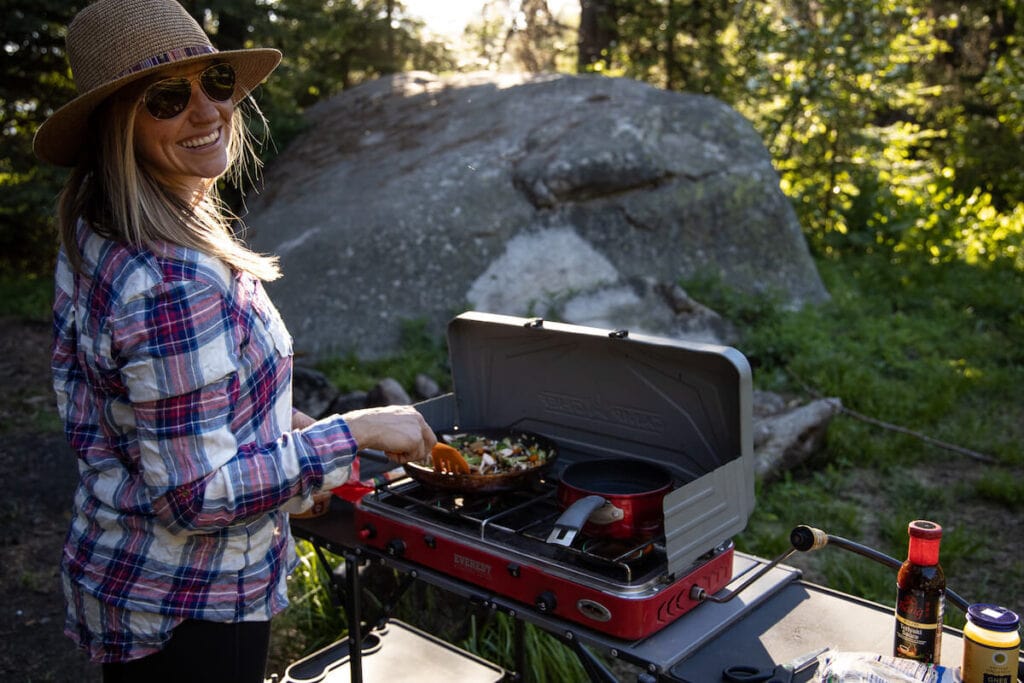
Additional Expenses
Finally, additional van life costs may include National or State Park fees, paid activities, vehicle maintenance, showers, laundry, Netflix, propane, firewood, the occasional haircut, tolls, or any other personal expenses that I’m not considering.
It’s good to budget a bit for these extra expenses so that you can have fun on the road and not be sideswiped by an unexpected maintenance expense, for example.
As I mentioned at the beginning, van life costs can vary widely depending on a lot of factors. I hope this blog post has helped you get a rough idea of how much you will need to budget for van life so you can plan ahead.
What do your van life expenses look like? Do you have any questions about van life costs? Share your questions, tips, and experiences in the comments, and make sure to sign up for our van life newsletter here.

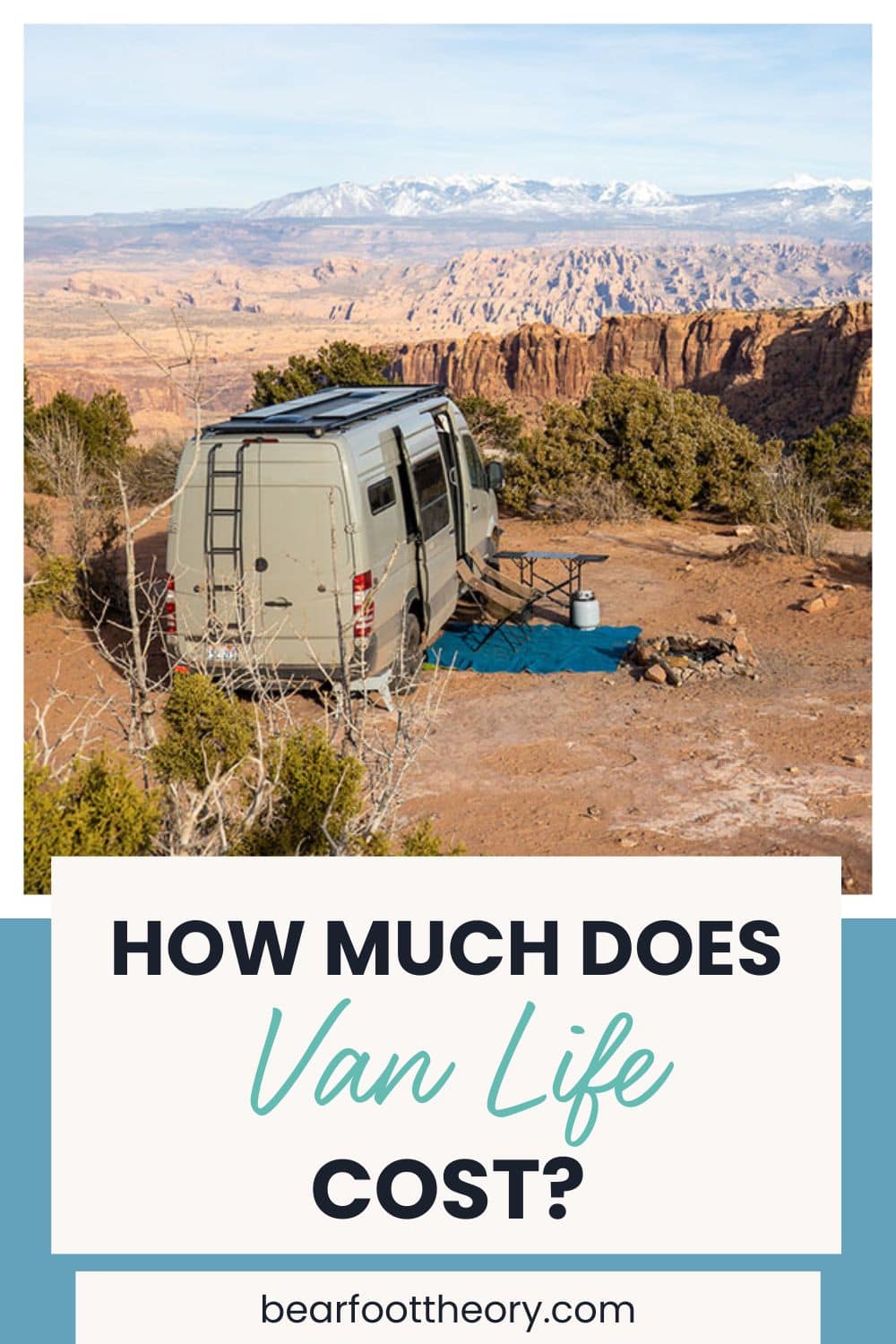
One of the nicest and cheapest things I look forward to when I vanlife travel is the ability to stop at a nationwide 24 hour fitness chain where I get to look forward to a good lift/exercise and a nice hot shower. These can range in price but if you paid 40/m or 480/yr is well worth the night over parking, exercise, and a good stretch, and that hot shower. Especially if on a long drive to a destination. I often chart my route by my gym membership to help ease my mind about where to stop over for the night.
Welcome back!
I so appreciate all the effort that goes into producing this content, and especially the practical experience you share from having lived it.
I check out all the imbedded links to stay current. I super enjoy your product endorsements and discounts.
Here’s wishing you an adventuresome and covid-free 2021.
So it looks like Van Life can be a great option if you have a high-paying corporate job and wads of saved cash or an expensive southern LA house to sell or a trust fund or a huge You Tube following? This article is probably extremely discouraging for most people so I just wanted to say that a DIY can be done for under $10,000 from what I have seen on facebook. First, make use of repurposed materials-pull from Facebook free, freecycle or craigslist free-especially with materials. Or ask people for their demo materials, trade for experience. Also, you don’t have to get the most expensive solar products or a dometic brand frig or a $150k Sprinter van with 4wd or anything like that. These guys have the “best of the best”, starting with the 4WD Sprinter. You can find perfectly good appliances on all the sites above (microwaves, dorm refrigerators, etc) all for free. Also the apps “Good Use” and “Trash Nothing”. A 4X4 Sprinter van starting at $55,000? No where have I seen that ever and I search all the time. But you can get an empty start-from scratch ProMaster Cargo Van with low miles for around $20,000 with front wheel drive (like we did). $600-$800 a month on food-yikes! I eat vegan as well but my food budget is much less-shop sales, farmer’s markets, “ugly” vegetables, etc. For those people reading this article and feeling hopeless about their own van conversions or future lives because of the costs listed here, there are blogs out there on how to do conversions for much, much less and how to live on much, much less. And, just an aside, having pets is expensive (vet bills, insurance, food, care). I think people who have good support on IG, You Tube and all the marketing side hustles and affiliate links as this site, don’t need to live on less. Not a complaint, just an observation.
Hey Kerry – My goal with this was to give the average person a realistic view of what it might cost to live on the road. I don’t disagree that it can be done for cheaper than my personal budget, which I mentioned throughout the post. That’s why we gave a range so people can estimate based on their personal spending habits. You sound like you’re very frugal, which is awesome, so I appreciate your input that it can be done on the lower end (or even cheaper) than the ranges I provided. Thanks, Kristen
Couldn’t agree more with you Kerry. Thank you for sharing this!
Unless you go through the time to build your own van to see your work come to life, I really don’t see why one would shovel out a ton of money to have a van converted into a camping van when you could save a good bit of money on an RV if said persons are too fragile or bougee for tent camping in the first place. Only difference is maybe a slight increase in fuel consumption? I feel it’s a safe place for the more sheltered people who believe having a sink and wifi still means your really hitting it out in the wild, camping. Maybe I’m missing something myself, and van life was never about camping. It sounds cool for when your older and can’t take the bumps or demand that come with your traditional ways of experiencing the outdoors. But I don’t understand when I am seeing people under 45 doing this. Carry on folks, but seeing what looks like a cubicle with a bed does not mix well with the evergreens or hardwood forests. Just get a Screensaver of Yellowstone in your office and put on some nature noises off youtube. It’ll save you a ton.
Hi CJ — we love van life, and the benefits over RV life and tent camping. Vans are smaller and easier to maneuver than RVs. Really it all comes down to personal preference, budget, and what amenities you are looking for. Many van lifers work remotely, so living out of a tent just wouldn’t be comfortable.
Yeh Kerry, too many folks don’t understand a sustainable approach to budgeting. We need reviewers who understand some first principles of living in general, much less van life. The Skoolie crowd does all of this on the cheap & laugh at the $150k conversions.
This was awesome! Thank you. Crazy thought the other day, sell house & assets buy van, travel and see it all. Once we’re done here in the states, we sell van and move to Europe and start all over (or take van) pipe dream but find this article put things into prospective. I didn’t even think of health insurance! Early 40s now, with good health care through work so yeah, that’s a tough one.
Love to dream, but love live and experience more!
Hi, I’m Kathy a lot to consider, I’ve been obsessed with the idea of van life, reality slaps you in the face, clears your head when considering the cost and skill with electric and plumbing safety when converting a van then life on the road costs more than you might imagine, a lot to consider for sure.
Lot of work in this sobering checklist, exposing a wide range of things to consider!
It anchors my dream in reality.
Thanks, Kristen!
Hi Claude – I try to give an accurate picture of my experience and the ranges I’ve seen of others living on the road. Sure, some people can do it for less, but it’s easy to forget a lot of the little expenses add up. Keep on dreaming, and hope we can be a resource to get you on the road.
Hi! Thanks for the informative article. I just wanted to add that gym membership is often purchased for the convenience of showering, as well as for exercise. This is especially important if your van doesn’t have shower capabilities and you tire of birdbath-type “showers” that you perform with a kitchen sink spray hose.
Hi Monika, yes! We should make that more clear- most people are using a gym membership as a shower option if they don’t have one inside their van. Thanks for sharing.
Well am truck mover I’ve build a Ford conversions van I’m on the road slot so when I return no motel to get iam getting ready to semi retire an do some travel work on the side.